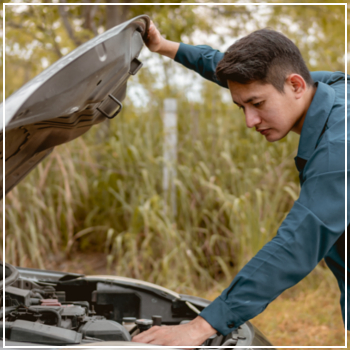 If you’ve started to notice unusual sounds while driving or see steam coming from under the hood, it might be a sign of engine trouble. Engine failure is often caused by neglecting regular maintenance, and understanding the causes can help you avoid costly repairs.
If you’ve started to notice unusual sounds while driving or see steam coming from under the hood, it might be a sign of engine trouble. Engine failure is often caused by neglecting regular maintenance, and understanding the causes can help you avoid costly repairs.
Overheating
One of the most common signs that your car is having engine issues is overheating. There are several possible reasons behind this:
- A damaged head gasket or seal
- Low oil levels leading to poor lubrication
- Low coolant or a coolant leak in the system
- Damaged radiator or faulty thermostat
- A broken water pump or malfunctioning cooling fan
- Wiring problems or engine mount issues
Driving with these problems can quickly lead to serious engine damage. If you notice any of these symptoms, it's best to get your car checked by a professional as soon as possible.
Insufficient Lubrication
Engine oil is essential for keeping all moving parts running smoothly. When oil levels drop too low, metal components can start rubbing against each other, causing excessive wear and increasing heat. This not only accelerates engine damage but can also lead to overheating and even part failure.
While skipping oil changes is a major cause of engine failure, other factors like oil leaks or a faulty oil pump can also play a role. You should watch for warning signs such as the oil light coming on or seeing oil stains under your car.
Detonation
Detonation happens when the combustion process in your engine becomes out of sync, creating excessive heat and pressure. This can cause knocking sounds and potentially damage internal engine components. Poor-quality fuel, faulty spark plugs, or overheating can all contribute to detonation.
Water in the Engine or Flooding
Driving through deep water or floods can allow water to enter your engine, which can be extremely damaging. Water can get into the intake manifold, leading to hydrolocking and preventing the engine from starting. To avoid this, always try to avoid driving through flooded areas.
Igoring the Cooling System
The cooling system works alongside the oil to keep your engine at the right temperature. Issues like a leaking hose, old or dirty coolant, or a faulty radiator can all lead to overheating and eventual engine failure. Regularly check your coolant level and follow the manufacturer’s recommendations for flushing and replacing the coolant.
Diesel Fuel in the Gas Tank
Diesel fuel is much thicker than gasoline and isn’t designed for standard passenger vehicles. If diesel accidentally gets into your gas tank, it can clog the fuel filter, damage injectors, and even cause the engine to seize. If this happens, don’t try to drive the car — have it towed to a mechanic immediately.
Recognizing early signs of engine trouble can save you time, money, and stress. Don’t ignore the warning signs — contact DaSilva’s Auto Body today for expert assistance before things get worse.
Ningbo Senmiao Trading Co., Ltd. , https://www.nbsenmiao.com
![<?echo $_SERVER['SERVER_NAME'];?>](/template/twentyseventeen/skin/images/header.jpg)